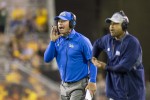Flash back to Oct. 8, when UCLA football suffered a tight 23-20 loss at Arizona State in a game that, at the time, seemed meaningful for its effect on the Pac-12 South division race.
That night would end up having zero impact on the conference playoff picture, but it stands as a meaningful point in UCLA’s season because it not only knocked the Bruins off the path to the division title, but also robbed them of their star quarterback, sophomore Josh Rosen.
The latter development would prove far more problematic than the first, for, by the end of the season, UCLA fans were asking for far less than the division title their team had been favored to claim in the preseason. They would have been happy to see a win over California, or even just a semicompetent offense.
That unit’s failures were fairly constant throughout UCLA’s 1-6 finish to the season, culminating in the worst performance of all: a measly 10-point output against a Cal defense that entered the game allowing the most points per game in the Football Bowl Subdivision.
Kennedy Polamalu, after just one season as the offensive coordinator, was dismissed the following morning in a move that seemed to suggest the Bruins will move on from trying to play the physical pro-style offense that Polamalu had implemented over the offseason.
The new offense, designed largely with Rosen in mind, dominated much of the talk during the preseason. It was lauded as a schematic shift that, along with the offseason emphasis on bulking up on both sides of the ball, could help the Bruins take the next step toward winning the conference and competing on a national level.
Early returns were mixed, but pointed in a positive direction.
After the season-opening loss at Texas A&M, coach Jim Mora pointed to the grit his team had displayed in coming back from a 15-point fourth-quarter deficit to send the game into overtime in a raucous road environment. And Rosen promised that his subpar first half would be the worst half of football he played all year.
UCLA would then beat UNLV at home and BYU on the road, putting forth a dominant defensive effort in the latter game that made the Bruins seem as ready as ever to take on their longtime Pac-12 nemesis, the Stanford Cardinal, in week four.
Sure enough, UCLA was ready for the Stanford offense and its dynamic playmaker, Christian McCaffrey. The 4-3 defense the Bruins had implemented over the offseason stood up to the Cardinal offensive line, a group that had in years past controlled the matchup between the two units.
UCLA would enter the final two minutes with a 13-9 lead over a team then ranked No. 7 in the nation, only to see Stanford engineer an improbable touchdown drive to win the game.
Even after that loss, though, the Bruins had plenty of hope left. As Rosen pointed out in the week after that game, they were just a couple plays away from being 4-0 and ranked among the top five teams in the nation.
A 45-24 home win over Arizona would reinforce that optimistic view of the season and framed the game at Arizona State as a matchup between the two most realistic contenders for the Pac-12 South title.
The Bruins and the Sun Devils played an ugly game, with Arizona State pulling out the three-point win largely thanks to Rosen’s exit with a shoulder injury.
From that point on, nothing was the same.
Backup quarterback Mike Fafaul – a former walk-on – took over for Rosen at the end of the Arizona State game, looking unprepared and overmatched as he flung two interceptions on 11 passes. Rosen wouldn’t see the field again, forcing Fafaul to man an offense without even a semblance of a productive running game.
Fafaul, who had waited five years at UCLA to see the field, had an inspiring story and did perhaps as well as he could, producing a few highlights – his 70-pass, five-touchdown outing against Utah and his first career win, over lowly Oregon State.
But without Rosen, the Bruin offense was far from productive, even after shifting back to the spread style familiar to most of the players from years prior.
Aside from the 52-45 loss to Utah, the defense kept the Bruins in games week after week, but seemed to wear down late in the season.
With a run game that finished second to last in the FBS in yards per carry, UCLA couldn’t control the clock, and in its final two games – against USC and at Cal – held the ball for fewer than 20 minutes.
Forced to spend ungodly amounts of time on the field, the defense wasn’t able to keep the team in the game, and the Bruins ended their season with their only two blowout losses – a 36-14 drubbing by the Trojans and a 36-10 loss to the Bears.

The football season this year was Alfordesque……..
It’s Dec. 5 and Adrian Klemm is still a member of UCLA’s coaching staff. WTF?